UPSC Daily Current Affairs- 24th January 2024 | Current Affairs & Hindu Analysis: Daily, Weekly & Monthly PDF Download
GS-I
Lake Retba
Subject: Geography
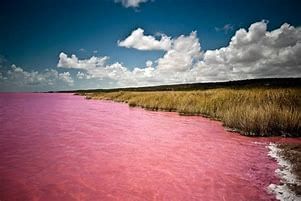
Why in News?
The Lake Retba’s waters are virtually devoid of life and are on the verge of disappearing due to pollution and mining.
About Lake Retba:
- It is also known as Lac Rose (the Pink Lake).
- Location: It is located north of the Cap Vert peninsula of Senegal, northeast of Dakar (Senegal).
- The lake is isolated from the sea by sand dunes.
- Its fresh water comes from the seasonal water table in the dunes, which are higher than the lake. Thus, the sea provides most of the lake’s water and all of its salt.
- The Pink Lake is one of the main tourist destinations in the Dakar region, primarily because of the pink colour of its waters.
- Why is it pink?
- The pink coloration is due to the proliferation of halophilic green algae (living in a salty environment), Dunaliella salina, which contain red pigments.
- The algae is associated with halophilic bacteria of the genus Halobacterium.
- This microscopic alga’s resistance to salt comes from its high concentration of carotenoid pigments, which protect it from light, and its high glycerol content.
- In fact, Dunaliella salina contains at least four antioxidant pigments (beta-carotene, astaxanthin, lutein and zeaxanthin), which are rich in vitamins and trace elements.
- When salinity is high, algae with red pigments thrive, and when salinity is low, they give way to other algae rich in green pigments.
Source: Down to Earth
GS-II
North Eastern Council
Subject: Polity

Why in News?
The Union Home Minister and Minister of Cooperation Shri Amit Shah addressed the 71st Plenary Session of the North Eastern Council in Shillong recently.
Background:-
- In his address, Shri Amit Shah said that the last 10 years under the leadership of Prime Minister Shri Narendra Modi have been the most significant for the development of the Northeast in the 75 years since independence.
About North Eastern Council:-
- The North Eastern Council (NEC) is not a constitutional body.
- It is a statutory organization.
- It was established under the North Eastern Council Act, 1971, as amended in 2002.
- Initially, NEC was an Advisory Body for the North Eastern Region (NER).
- Now NEC is mandated to function as a Regional Planning Body for the North Eastern Region.
- The Union Cabinet, in June 2018, approved the proposal of the Ministry of Development of North Eastern Region (DoNER) for the nomination of the Union Home Minister as ex-officio Chairman of the North Eastern Council (NEC).
- The Cabinet also approved that the Minister of State (Independent Charge), Ministry of DoNER would serve as Vice Chairman of the Council.
- The Council comprises Governors and Chief Ministers of constituent States and three members nominated by the President.
- While formulating the regional plans for the North Eastern Region, it is mandated to give priority to schemes and projects, benefitting two or more States, provided that in the case of Sikkim, the Council shall formulate specific projects and schemes for that State including the review of implementation of such project and schemes.
- To fulfil its mandate, the NEC has been implementing various projects in different sectors.
- Over the years, NEC has achieved the construction of 10500 km. of roads, supported the installation of 695 MW of power plants, constructed transmission and distribution lines, improved in infrastructure of 5 major airports and constructed of new airport in Tezu, Arunachal Pradesh.
Source: PIB
Maldives rules out Research by Chinese Vessel in its Waters
Subject: International Relations
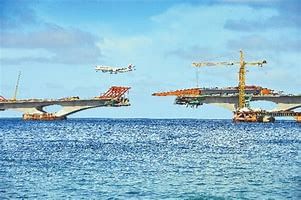
Why in News?
Island nation’s Foreign Ministry says Xiang Yang Hong 03 will arrive for rotation of personnel, replenishment following a Chinese govt. request.
Background:
- As per the foreign ministry of the Maldives Government, diplomatic request was made by the Chinese government for the necessary clearances to make a port call, for rotation of personnel and replenishment.
- The ministry said that the Chinese research vessel Xiang Yang Hong 03 will not be carrying out research in Maldivian waters, but will arrive for a port call.
- Reports of Chinese vessel heading to Maldives have drawn considerable attention in India.
- This was significant especially in the wake of Sri Lanka announcing a one-year moratorium on foreign research vessels calling at the island’s ports.
- This was after India voiced concerns over visits by a Chinese vessel.
- In October 2023, the Chinese research vessel Shiyan 6 had docked at the port of Colombo for replenishment and to undertake joint military scientific research in Sri Lanka’s EEZ.
- This was significant especially in the wake of Sri Lanka announcing a one-year moratorium on foreign research vessels calling at the island’s ports.
- The Ministry said the Maldives has always been a welcoming destination for vessels of friendly countries and continues to host both civilian and military vessels making port calls for peaceful purposes.
The Chinese Vessel Xiang Yang Hong 03:
- The research vessel Xiang Yang Hong 03is expected to arrive in Malé on 8 February, following a planned exploration of the southern Indian Ocean from January to May 2024.
- The arrival of Xiang Yang Hong 03, which marine traffic portals describe as a research or survey vessel, is expected early next month.
- The vessel had earlier called at Sri Lankan ports, but did not obtain clearance for a visit early this year.
Deteriorating Ties between India & Maldives:
- The visit of the Chinese vessel to the Maldives is the latest source of tension for India, during a challenging phase of its ties with the Maldives.
- Maldivian President Mohamed Muizzu, who was elected to office in September 2023, has demanded that Indian troops be withdrawn from the Maldives.
- He did not renew a joint hydrographic survey exercise with India.
- During his recent state visit to China, Mr. Muizzu also pledged to elevate strategic ties with the Chinese.
- Besides holding bilateral talks with Chinese President Xi Jinping, Muizzu’s China visit was marked by signing 20 agreements, an aid of $130 million to Maldives.
- Despite sustained pressure from the Indian government, Mohamed Muizzu granted permission on 3 January for Chinese research vessels to dock in the Maldives.
- India had previously expressed objections to the Sri Lankan and Maldivian governments regarding the docking of the Xiang Yang Hong 03.
Growing Chinese Presence in the Indian Ocean:
- In April 2023, a representative from the Indian Navy briefed the Parliamentary Standing Committee on Defence, revealing that China had experienced a significant naval expansion over just a decade.
- Importantly, they noted that China's naval fleet had grown from 250 to over 350 ships, solidifying its position as the world's largest navy.
- The representative highlighted further concerns about the nature of the data generated by Chinese research activities in international waters.
- While regulations permit research in these waters, the representative pointed out that the data collected often has both civilian and military applications.
Source: Indian Express
Gender Equity in Education: A Focus on Early Childhood
Subject: Governance
Why in News?
Education is a cornerstone of societal development, and addressing gender-related issues within it is crucial for progress
- While ASER 2023 data on learning outcomes may suggest gender equity, a closer look reveals persistent gender discrimination.
Gender Equity: Learning Outcomes Parity
- Gender Equity in Learning: Analysis of learning outcomes, such as test scores, shows parity between boys and girls in elementary and secondary classes across India.
- Example: In Classes 3 and 5, girls and boys score equally in mathematics, both at 63 and 53, respectively.
- Subject Scores: Gender differences in subject scores rarely exceed one percentage point.
Widening Gender Gap
- Increased Education: Girls in India are receiving more education than ever before, with the mean years of schooling nearly tripling from 1.7 years in 1990 to 4.7 years in 2018.
- Boys’ Progress: Boys have also seen educational improvements, with the average attainment increasing from 4.1 to 8.2 years.
- Growing Gender Gap: Despite girls making significant strides in education, the gender gap, measured as the difference in attainment between males and females, has grown over time, from 2.4 years to 3.5 years.
- Global Trends: India’s divergence from global trends is notable, as many countries have seen equal improvements in education for both genders.
Barriers to Education
- Progressive Gender Gap: As education levels rise, barriers for girls become more significant, influenced by social norms, stereotypes, and adolescent-related factors.
- Class 1 to Class 8: Dropout rates shift dramatically, with nearly twice as many girls dropping out by Class 8 compared to boys.
Early Childhood Education (ECE)
- Gender Bias in ECE: Gender discrimination begins at the earliest stages of education, as revealed by the Annual Status of Education Report “Early Years.”
- Private vs. Government Schools: More boys are enrolled in private institutions, while girls are often sent to free government schools, reflecting societal biases.
- Age Correlation: A five percentage point gender difference in enrollment exists at the age of four, growing to eight percentage points by age eight.
- Impact of Gender Norms: Societies valuing male children’s education tend to withdraw more girls from school.
Focus on ECE
- Policy Shift Needed: Addressing the gender gap in education requires a shift towards Early Childhood Education (ECE) to tackle the roots of gender norms.
- Age of Influence: Children between three and seven are highly impressionable, forming biases about gender roles during this period.
- Challenges: Insufficient funding, poor quality, and the absence of legislation for universal ECE access pose challenges in India.
- Investment Returns: Longitudinal studies indicate that every dollar invested in ECE yields substantial returns, proving its cost-effectiveness.
- Government Initiatives: Programs like “Beti Bachao, Beti Padhao” and the Draft National Education Policy emphasize the importance of ECE.
Conclusion
- The gender gap in education, particularly in the early years, requires immediate attention and intervention. Establishing a regulatory framework, adequate funding, and quality standards for ECE is essential.
- By eliminating gender stereotypes in preschools, we can work towards erasing the gender gap in education.
- The benefits of investing in girls’ education are vast, ranging from reduced poverty and crime to improved economic development.
- It is time to prioritize early childhood education to create a brighter and more equal future for all.
Source: Hindustan Times
GS-III
What is the Mpemba effect?
Subject: Science and Technology
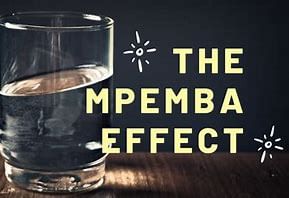
Why in News?
The Mpemba effect continues to captivate scientists with its complex interplay of physical mechanisms.
About Mpemba effect:
- It is named after Tanzanian student Erasto Mpemba, who brought attention to this counterintuitive phenomenon in 1969, making for curious observations.
- The effect is that hot water can freeze faster than cold water in similar conditions.
- While Aristotle, Francis Bacon, and René Descartes had noticed the effect centuries earlier, the Mpemba effect caught scientists’ attention only more recently.
- Different Experiments
- Researchers have conducted numerous experiments to determine the causes of this confusing phenomenon, but a consensus conclusion remains wanting.
- One cause, they have posited, is microbubbles left suspended in water that has been heated by boiling.
- These cavities promote convection and transfer heat faster as the water cools.
- Evaporation: as warmer water evaporates more, it also takes away some heat (evaporation is inherently endothermic, which is how sweat cools your skin). Both convection and accelerated heat transfer are enhanced in warmer water because such water is less dense.
- Yet another factor could be the presence of frost in cold water. Frost is an insulator and could slow the loss of heat.
- Scientists have also considered whether compounds in water like calcium carbonate could be precipitated by boiling, and then dissolve, thus increasing the water’s freezing point.
Source: The Hindu
Pulsars and Their Glitches: A Glimpse into Neutron Star Secrets
Subject: Science and Technology
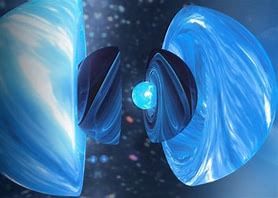
Why in News?
In 1967 a group of astronomers at the University of Cambridge stumbled upon a celestial mystery that would unravel the secrets of neutron stars.
- Jocelyn Bell Burnell and Antony Hewish observed periodic signals emanating from the depths of space, eventually discovering the first pulsar, PSR B1919+21.
Pulsars and Neutron Stars
- The Birth of a Pulsar: PSR B1919+21 initially puzzled scientists, who considered various explanations, even the possibility of signals from extraterrestrial life.
- Neutron Stars: Neutron stars are born from the remnants of massive stars that didn’t become black holes. They are incredibly dense and primarily made up of neutrons.
Behind the Radiation: Lighthouse Effect
- Radiation Beams: Pulsars emit focused beams of radio waves, similar to a lighthouse’s rotating light.
- Rotation Slowdown: Neutron stars gradually slow down their rotation, and this process generates the pulsar’s radio signals.
The Mystery of Glitches
- Sudden Speed-Ups: In 1969, scientists noticed unexpected and brief increases in the rotation speed of pulsars, known as “glitches.”
- Unsolved Riddle: Even after more than four decades of study, the cause of these glitches remains a mystery, although scientists have developed some ideas.
- Common Occurrence: Around 700 glitches have been observed in more than 3,000 pulsars.
Clues in the Rotation
- Post-Glitch Behavior: During a glitch, the pulsar’s rotation rate temporarily increases before gradually returning to its previous speed.
- Sign of Internal Changes: The slow post-glitch recovery suggests that the neutrons inside the star behave like a special kind of fluid, called a superfluid, with very low friction.
- Superfluids and Vortices: Superfluids, like the one inside a neutron star, exhibit vortex behavior, which is like tiny whirlpools.
The Glitch Mechanism
- Neutron Star Structure: Neutron stars have a solid outer layer with superfluid patches and a core primarily made of superfluid.
- Vortex Pinning: Vortices within the superfluid like to stick to the crust or solid parts of the star, which keeps the superfluid rotating.
- How Glitches Happen: As the star loses energy over time, the crust slows down, but the pinned vortices stay at their original speed. When the difference becomes too great, the vortices are released, transferring energy from the superfluid to the crust, causing a glitch in the pulsar’s rotation.
Source: Frontiers
GS-IV
Supreme Court Labels Gujarat Police Actions as “Atrocity”
Subject: Ethics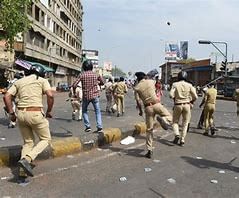
Why in News?
In a significant development, the Supreme Court of India, made oral observations condemning the 2022 incident involving four Gujarat Police officers.
- These officers had publicly flogged some men, restraining them to a pole, under the allegation of disrupting a garba event in the Kheda district.
Kheda Incident
- Public Flogging and Video Documentation: The incident in question involved the public flogging of some men who were tied to a pole. Shockingly, videos of the brutal act were also recorded.
- Lack of Legal Authority: Justice B.R. Gavai questioned whether the officers had any legal authority to restrain individuals in such a manner and subject them to physical abuse. Justice Sandeep Mehta expressed similar concerns.
Ethical Dimensions Put to Question
- Human Rights: Police misconduct and brutality violate citizens’ fundamental rights, including the right to life, liberty, dignity, equality, and justice. They also breach international human rights standards.
- Rule of Law: Such actions undermine democratic societies based on the rule of law, diminishing law enforcement agencies’ legitimacy and fostering a culture of impunity where police act as judge, jury, and executioner.
- Professionalism: Police misconduct erodes the professionalism, integrity, and morale of the police force. It negatively impacts training, discipline, supervision, and leadership, pressuring honest officers to conform to unethical practices.
- Social Harmony: Police misconduct disrupts social cohesion, breeding resentment, fear, anger, and distrust, especially among marginalized groups. It contributes to social conflicts, violence, and extremism, threatening national peace and stability.
Violation of D.K. Basu Judgment (1996)
- Supreme Court’s Historical Verdict: The actions of the police officers were found to be in contempt of the Supreme Court’s landmark D.K. Basu judgment of 1996. This judgment emphasized the importance of protecting individuals from torture and abuse by the police and law-enforcing officers.
- Prohibition of Third-Degree Methods: The D.K. Basu verdict explicitly prohibited the use of “third degree” methods or torture during interrogation and investigation.
Supreme Court’s Response
- Ignorance of Law: Justices Gavai and Mehta were not convinced by the argument put forth by senior advocate Siddharth Dave, representing the police officers, that there was no “willful disobedience” of the D.K. Basu verdict by his clients. The Bench questioned whether ignorance of the law could serve as a defence in this context.
- Duty of Police Officers: The Bench emphasized that every police officer must be aware of the legal principles established in the D.K. Basu judgment.
Conclusion
- The Supreme Court’s strong stance against the actions of the Gujarat Police officers in this case underscores the importance of upholding the principles of justice, human rights, and the rule of law.
- This incident serves as a reminder of the duty and responsibility that law enforcement agencies have in protecting the rights and dignity of individuals while performing their duties.
Source: The New Indian Express
|
63 videos|5408 docs|1146 tests
|
FAQs on UPSC Daily Current Affairs- 24th January 2024 - Current Affairs & Hindu Analysis: Daily, Weekly & Monthly
| 1. What is the Mpemba effect? |  |
| 2. What are pulsars and their glitches? |  |
| 3. What is Lake Retba? |  |
| 4. What is the North Eastern Council? |  |
| 5. Why did Maldives rule out research by a Chinese vessel in its waters? |  |





















